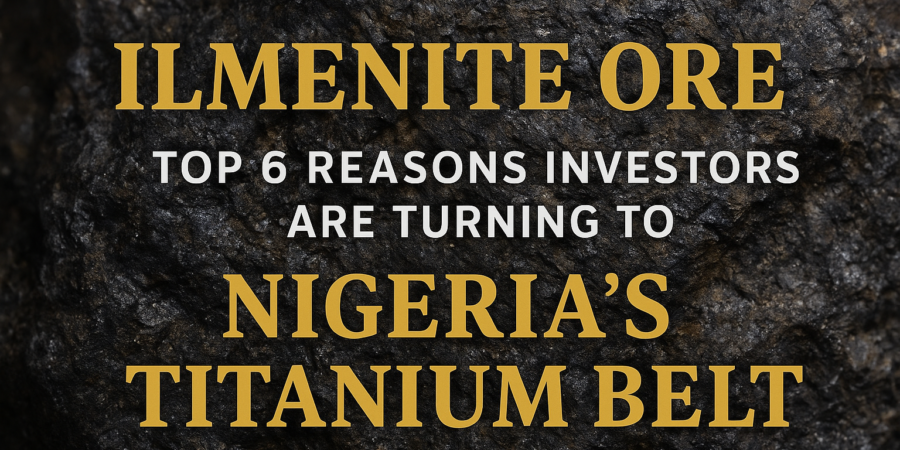As the global titanium industry braces for record demand from aerospace, renewable energy, and high-tech manufacturing, Nigeria has quietly emerged as Africa’s next big opportunity for ilmenite (titanium ore) investment.
This surge of interest isn’t just about the ore’s abundance; it’s about timing, policy, and global supply chain realignment.
Nigeria’s “Titanium Belt” – stretching across Ogun, Nasarawa, Kaduna, Kano, Plateau, Cross River, and Kogi States, is drawing the attention of miners, traders, and strategic investors looking to secure long-term access to titanium feedstock.
Here are the six key reasons why investors are now turning to Nigeria’s ilmenite sector.
1. Strategic Global Demand for Titanium Feedstock
Titanium is indispensable for industries that shape the modern world; from aerospace alloys and medical implants to paints, coatings, and solar panels.
The global titanium feedstock market, valued at over USD 22 billion in 2024, is expected to grow steadily as clean-tech and lightweight manufacturing expand.
However, traditional producers like Australia, South Africa, and Mozambique are facing tightening regulations, rising costs, and logistical bottlenecks.
Nigeria, with its untapped reserves and cost advantage, offers a timely and lucrative alternative.
2. Nigeria’s Proven Ilmenite Grades Match Global Standards
Ilmenite deposits in Nigeria average between 50% and 73% TiO₂, comparable to commercial grades found in Mozambique’s Moma Mine and Kenya’s Kwale Mine.
These grades are suitable for:
- Titanium dioxide pigment production
- Welding rod flux
- Ferro-titanium and steel alloy manufacturing
- Chemical and aerospace applications
This means investors can enter the global titanium value chain without expensive beneficiation hurdles.
Nigeria’s ilmenite doesn’t just exist, it performs.
3. Supportive Government Policy and Export Framework
Nigeria’s mining sector is governed by the Minerals and Mining Act (2007), which offers robust investor protections, tax incentives, and a transparent licensing regime.
Key government features that favor ilmenite investment include:
- 100% foreign ownership of mining projects
- Tax holidays for pioneer industries
- Duty-free importation of mining equipment
- Export permits that facilitate direct global trade
The government’s renewed focus on mineral diversification beyond oil has positioned titanium and other metallic ores as strategic export priorities.
4. Logistics and Port Access Are Rapidly Improving
Efficient logistics are critical for export-grade minerals.
Nigeria offers two major mineral export corridors:
- Lagos Ports (Apapa and Tin Can Island) – best for Europe and the Americas
- Port Harcourt / Onne – ideal for Asia and the Middle East
For investors setting up local beneficiation or storage facilities, proximity to these ports reduces lead time and shipping costs.
Several logistics companies now specialize in containerized mineral movement, ensuring ore can reach the ports in as little as five days.
5. Cost Advantage: Lower Operational & Royalty Expenses
Nigeria’s operational costs remain among the lowest in the African mining corridor.
Local trucking, labor, and royalty structures favor bulk transport, especially using 40-foot containers (≈54 tons).
Here’s a typical cost structure under FOB Lagos/ Port Harcourt/ Port Harcourt:
- Ilmenite ore: ₦120,000 per ton
- Royalties & taxes: ₦1.5 million per truck
- Trucking (mine to port): ₦3.4 million
- Rebagging & port handling: ₦1.08 million
Even after all charges, the FOB cost per ton stands around ₦300,000 (≈USD 200/ton) – undercutting competitors in East Africa and Asia.
For investors, this means higher margins and stronger competitiveness in international markets.
6. Access to Verified Suppliers through the Nigerian Mineral Exchange (NME)
Perhaps the biggest shift in investor confidence comes from digital transparency.
The Nigerian Mineral Exchange (NME) now serves as the industry’s official hub for:
- Verified ilmenite sellers and miners
- Real-time pricing and FOB quotes
- Buyer-seller matchmaking
- Licensing verification and document assistance
Investors can now source, verify, and transact directly through a structured platform, eliminating middlemen and fraud risks that once plagued the mineral trade.
With its integrated listing for Ilmenite (Titanium Ore) FOB Lagos/ Port Harcourt, NME has made Nigeria’s titanium sector accessible and trustworthy for international partners.
Conclusion
The rise of Nigeria’s titanium belt is no coincidence.
It’s the product of abundant reserves, a business-friendly framework, improved logistics, and transparent digital infrastructure.
For investors seeking a sustainable foothold in the titanium feedstock market, Nigeria offers:
✅ Cost efficiency
✅ Reliable logistics
✅ Verified supply chains
✅ Global-standard grades
As the world races to secure strategic minerals for the clean-tech revolution, Nigeria’s ilmenite is poised to shine, not as a newcomer, but as a new frontier.
How We Can Help You
🚢 Looking to invest or source Ilmenite (Titanium Ore) from Nigeria?
Explore our listing on the Nigerian Mineral Exchange (NME).
💬 Or message directly via WhatsApp: +234 813 079 9304 to begin your titanium sourcing journey today.
READ ALSO:
How to Buy Lead Ore from Nigeria: 12 Things Every Smart Buyer Must Know




